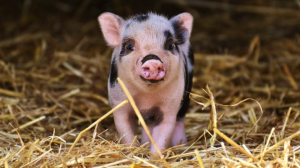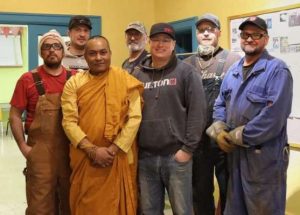
One of the premises of my book Kindness for All Creatures (Shambhala 2019) is what I call the triad of compassion. This refers to the interdependence of humans, animals, and the environments that we share. This triad is always intimately engaged, for better or for worse, whether we live in a busy city or in a remote area. No matter where we live, we don’t have to look too far to find people suffering from a lack of nutrition or simply not enough to eat. In every American city, and in the wealthiest of countries, we find poverty, inequity, and hunger. This fact has only worsened as the climate emergency has progressed and the pandemic continues.
On the heels of the passing of one of the world’s most beloved and admired teachers, the humanitarian and Buddhist activist Thich Nhat Hanh, let us face this universal problem of hunger and malnutrition by acknowledging those who are working to do something about the crisis. Around the globe, through inherited poverty, migration, wars, crop failure, or simply changeable karma, people lack basic meals to support health and the capacity to make a better life. Thich Nhat Hanh spent his life advocating for those suffering, and showed us all that no goal is too big and no action too small to make a difference in the lives of others.

Whether a local, small-scale, or global enterprises, millions of people care about this essential human need, especially when it relates to starving children. One organization working hard on this issue is Feeding From Far (FFF), which supports feeding those in India already burdened by the pandemic and joblessness, additionally unable to access sufficient quality food. Through crowdfunding on Ketto, which is similar to GoFundMe, FFF is aiming to raise US$1 million to feed the neediest:
Since the first lockdown, we have been taking care of over 7,000 families in the largest and oldest waste dumping ground and slum in Mumbai – Govandi. Since most residents of Govandi are migrants, daily wage workers, rickshaw drivers, rag pickers etc.- they are all unemployed and unable to afford basic food at the moment.
(Ketto)
FFF has delivered three million meals since the start of the pandemic, stating: “The decentralized model of hunger eradication through community engagement has been successful in Govandi; we tried it in Chiplun too, and we would like to take it to the whole country.” (Ketto)
I and my small sangha felt moved to support this venture in 2021, and have received much inspiration and hope by following their progress up and through their recent milestone of receiving the #CovidSoldier of the Week award for their commitment to feeding the needy in Mumbai.*

Hunger is hunger, wherever it occurs. In the US, it pervades many urban and rural areas. One new organization, Support+Feed (S+F), offers meals to those who need them in Los Angeles, New York, Philadelphia, and Washington, DC, and incorporates the principles of philanthropy and using fame and influence to help vital causes. Many celebrities use their fame and money in this way. S+F uses high-quality plant-based foods with the help of volunteers to prepare and deliver meals to those who need them, to benefit their health and the health of the planet. Serving vegan meals is one way to reduce the dietary carbon footprint and offer people healthier choices than standard government meals for those in need. S+F’s meals are prepared by professional chefs using fresh organic produce:
In 2022, we will expand to thirty states and other countries, providing a chance to make an impact larger than the meals we deliver. Not only can we feed people, every plant-based meal we deliver positively affects the health of the recipient and our planet. Reducing animal agriculture is not the entire solution, but there is no solution without it.
(Support+Feed)

Globally, child malnutrition hurts cognitive function and contributes to poverty by impeding people’s ability to lead productive lives. Poverty is the leading cause of hunger, but poverty also results from hunger, in a cyclical relationship. Despite the importance of childhood nutrition and significant progress in the last 25 years, childhood hunger is still rampant globally.
Action Against Hunger is a large-scale NGO working to reduce hunger and disease and to increase access to long-term solutions:
We save the lives of children and their families. We are there for them before and after disaster strikes. We enable people to provide for themselves, see their children grow up strong, and for whole communities to prosper. We constantly search for more effective solutions, while sharing our knowledge and expertise with the world. We push for long-term change.
(Action Against Hunger)
To do this, they employ almost 10,000 people and rely upon donations and funding from grants to support their programs worldwide:
Action Against Hunger’s food security and livelihoods programs tackle the root causes of hunger by addressing problems of production, access, and income. Encompassing a wide array of activities customized to meet a community’s specific needs, our programs are designed to bolster agricultural production, jumpstart local market activity, support micro-enterprise initiatives, and otherwise enhance a vulnerable community’s access to sustainable sources of food and income.
( Action Against Hunger)

In previous articles, I have explained why community regenerative farm and garden initiatives draw people in to accessing healthy food, and to learning how to cultivate gardens themselves, another key link to reducing hunger and increasing self-sustainability per household, village, or neighborhood. Direct access to healthy soil, water, and clean air is key to enabling people everywhere to grow basic produce for their well-being, including a community support aspect.
Equally vital to the sustainability of food systems are access, equity, and inclusion. Blue Dasher Farm in South Dakota maintains a Database of Under-represented Groups in Agriculture to connect marginalized people and share resources about their labors of love through farming. Peer support, cultural community growth, and knowledge resourcing are keys to a more equitable society in food justice and sustainability. Blue Dasher Farm’s vision states:
It is clear that the BIPOC [Black, Indigenous, and People of Color] leaders in urban agriculture are also the leaders in food justice, and food justice is an essential component of transforming food systems through regenerative agriculture. . . . We can grow food and conserve biodiversity and environmental health. . . . Focal food systems include rangeland, pastured dairy, perennial and annual crops, orchards, and honeybees.
(Ecdysis Foundation)

BIPOC-held farms are key to reconnecting people with dispossessed lands and cultural ways of living that colonialism and white supremacy in the US have undermined for centuries. Through plant cultivation and animal husbandry, renewing knowledge, and sharing stories in community, cultural bonds are restored and the triad of compassion is rewoven. One such farm describes this as:
A journey that has never been business as usual. As friends, neighbors, colleagues, and clients alike became increasingly supportive of our stories from the farm, they began to share their own unique food-farm stories and histories, as well as their time, and energies in support of what we had begun. We quickly became engaged in a restorative-healing approach to land and food — one that honors the interconnectedness of us all.
(Giving Compass)
May you feel moved to support any of the numerous efforts to reduce hunger and malnutrition in your local area or through a vetted global enterprise. May you find ways to support the deconstruction of colonialism by promoting minority-owned sustainable farms and gardens. May you also reconnect with lands, holistic food cultivation, and the joy of tending others, whether animal, vegetable, or human. May all beings be free from suffering, including fear, hunger, and oppression, wherever beings exist.

* #CovidSoldier of the Week award image (The Better India)
See more
Feeding From Far-Ration Distribution Amid Lockdown (Ketto)
Our Founder (Support+Feed)
Food Security & Livelihoods (Action Against Hunger)
Database of Under-represented Groups in Agriculture (Ecdysis Foundation)
Nigeria Turns To Technology To Reduce Food Waste And Fight Hunger (Giving Compass)
India’s Covid Soldiers (The Better India)
Support + Feed, Plant-Based Food Initiative Founded by Billie Eilish’s Mom, Expands Into Three Cities (Variety)
World Child Hunger Facts (Hunger Notes)
Related features from BDG
Buddhistdoor View: Discourse and Praxis – The Interconnected Legacy of Thich Nhat Hanh
The Cloud Is Not Lost – In Honor of Thích Nhất Hạnh
Cultivating Wild: The Miracle of Dharma’s Garden!
Buddhism, Circa 2030
Right Mindfulness and Vegetable Gardens
Buddhistdoor View: Seizing the Moment at COP26
Grow Your Garden: A Simple Practice in Reflection, Part One
For the Earth: Buddhist Environmental Thought and Activism
Planting the Seeds of Enlightenment
Is This Buddhism? The Oneness of Spiritual Liberation and Social Justice












